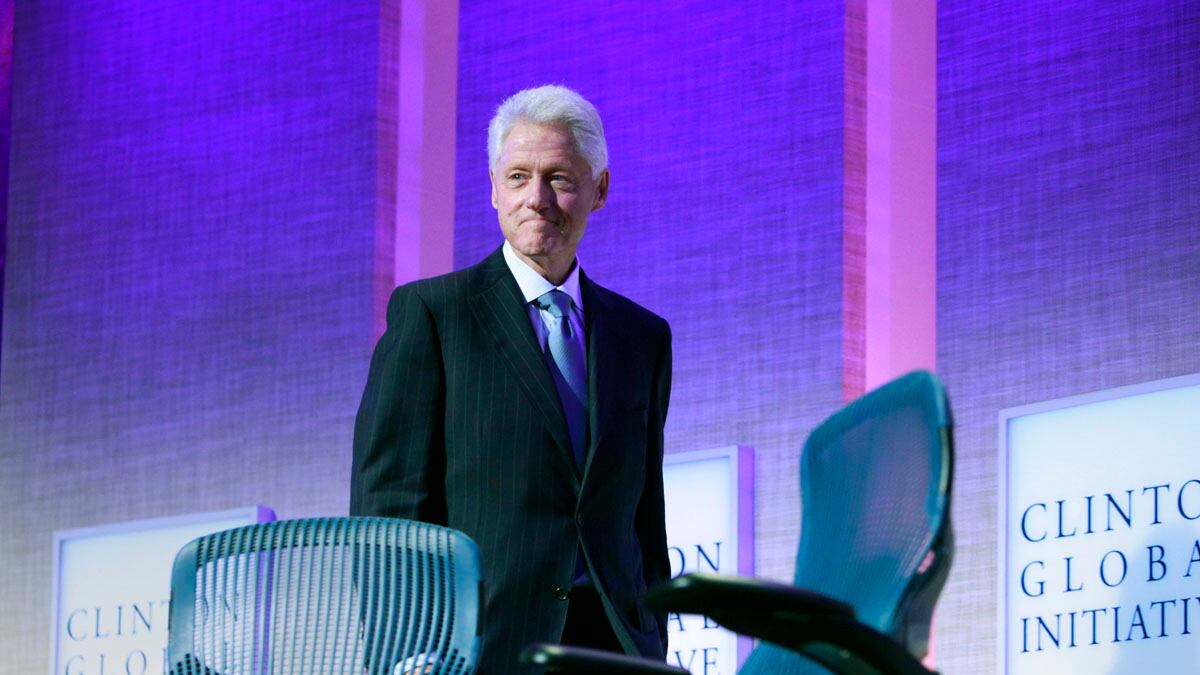Having drunk the Clinton Global Initiative to the dregs, a hopey-changey hangover ensues.

Cool, exclusive, nerdy, and chock-a-block with enough celebrities to set off a near-Pavlovian reaction in the inveterate namedropper, CGI ultimately is supposed to be about helping people, particularly underrepresented groups in the developing world. But it’s really about ferreting out injustices wherever they may lie and dousing them with a nonpartisan douche of media, money, star power, slideshows, and hard work from truly committed people on the ground. It’s a heady brew.
A registered 501(c)(3), CGI was founded by the 42nd president in 2005, four years after he left the White House. The group’s eighth annual meeting, held in New York, wrapped up on Tuesday after three days that showed the undiminished luster of the Clinton call list, gathering some of the boldest of bold-faced names together for a sort of world leader day camp.
Organizations are invited to become members of the initiative, and pay a membership fee of $20,000 a year, which gets them access to the annual meeting, a “dedicated account representative,” and entrée to smaller events held year ’round, among other perks. Nineteen thousand dollars of the membership fee is tax deductible.
Most people, tax deduction or no tax deduction, are never going to get inside the annual meeting to see the progress reports and other updates President Clinton delivers from the rostrum during lunchtime plenary sessions, during which attendees pick at foods that look so locally sourced there must be a farm on the roof of the conference center somewhere.
The meeting closed boasting “150 new commitments made valued at more than $2 billion, expected to impact nearly 22 million people.” Even for Bill Clinton, this seems like a lot for three days’ work. The United Nations was meeting a couple miles downtown, and nobody expects much to come of that.
But isn’t the Clinton Global Initiative basically a cooler version of the United Nations? A place where one may bump into designer Oscar de la Renta as well as Egyptian President Mohamed Morsi? Doesn’t that have to mean something? Mustn’t some of the sprezzatura of the man who draped Jackie O. in couture rub off on the one-time Muslim Brotherhood leader? In a world where Donna Karan arguably has as much influence on how people live as Aung San Suu Kyi, should cynicism intrude on this marriage of minds?
Any chance of the press catching a spontaneous moment with, say, Goldman Sachs chief executive Lloyd Blankfein is squelched by more than 300 volunteers, 40 of them brought on to manage the credentialed hacks who are stuffed with Starbucks coffee and free sandwiches—presumably to slow them down and prevent them from bum-rushing Barbra Streisand in some unguarded corridor. Also, there are no unguarded corridors.
On the day Republican presidential nominee and Bain Capital founder Mitt Romney was to speak, a half-dozen protesters, one of them dressed as some sort of robotic Occupy-style Bain monster, gathered on Seventh Avenue across from the Sheraton where most of the conference’s events were held. They chanted: “One, we are the people. Two, we are united …” That was about the extent of any protesting.
The air of CGI is thick with the miasma of biz-school neologisms. “Cross-sector,” “compounding factor,” and inspiring statistics fly like bolts from some particularly cheery crossbow.
Even Charlie Rose used the rightly maligned word “synergy” in one interview with Chelsea Clinton that left the press room chattering about what an impressive young woman the daughter of two of America’s most prominent politicians is. Chelsea—who is on the board of IAC, Newsweek and The Daily Beast’s parent company—may indeed herald a new kind of involvement in what one reporter idly speculated might be our “post-political age.”
The vague and the buzzy converged dizzily at a press conference, pushed back more than three hours from its scheduled time, that featured Black Eyed Peas front man Will.i.am and representatives from Delos, a for-profit real estate developer. Two women in the press conference area complained in European accents that Deepak Chopra, who was originally slated to present, would not be in attendance. After the pop star and Delos folks put forward their plan for a new building standard focused on health and well-being, a young woman stood during the question-and-answer period to raise an objection. As the presenters were talking, it had occurred to her that this idea might not succeed because she could not figure out what to hashtag the tweets she was sending out on her smartphone. Her implication was that if an idea is not properly hashtag-able, it was doomed to obscurity and failure.
There were of course moments of rather greater gravity. Romney and President Obama both had their 15 minutes at the microphone. Morsi, arguably a more important guest than either of the presidential candidates, spoke second to last and reiterated that he did not head a theocratic state, to tepid applause.
Here’s the rub—good things do come out of the Clinton Global Initiative. The atmosphere is collegial, and Clinton, with his habit of sitting in a chair on the stage and leaning back, one long leg folded over the other, while someone else is at the podium, gives the impression of the affable dean who has brought together all these students of his hope for the future. One the final day of the gathering, Clinton announced a partnership between 13 American health-care providers and universities, including a number of Ivies, along with the Rwandan government, to send hundreds of American faculty members to the African nation every year to help build a self-sustaining health-care system that the Rwandan people will be able to manage themselves.
Therein lies the hair of the dog that proves salubrious after the Clinton binge. These people can do something. There are lots of them. Their net personal worth totals more than the gross domestic products of several small nations combined. Secretary of State Hillary Clinton alone seems determined to outpace the entire Chinese Air Force for hours spent above the ground. Bill Clinton, who, as his daughter pointed out, has now outlived all of the male relatives on either side of his family in recent memory, seems hearty and hale, despite a political career that has been, shall we say, eventful.
This is what the designers know and what the coffee-swilling members of the New York press know and what Nicholas Kristof knows and what the handful of ignored protesters know, too. It’s what Mohamed Morsi knows as he makes a case for his nascent democracy, raising his eyes from his script to make a rare moment of contact with the audience when telling them that the transition to rule by the people is hard, that he represents the Egyptian people, and that this former University of Southern California material sciences doctoral student is finding it a harder challenge than he could have imagined.
The world can be changed for the better. Everyone can lend a shoulder. Those who have the most are obligated to do the most. Will they?






